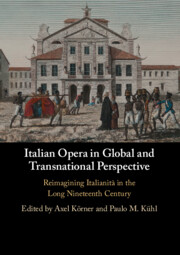 Italian Opera in Global and Transnational Perspective
Italian Opera in Global and Transnational Perspective Book contents
- Italian Opera in Global and Transnational Perspective
- Italian Opera in Global and Transnational Perspective
- Copyright page
- Contents
- Figures
- Tables
- Examples
- Notes on Contributors
- Preface and Acknowledgements
- 1 Opera and Italianità in Transnational and Global Perspective
- 2 Giving Singers a Voice
- 3 Nina d’Aubigny’s ‘Italian Voice’
- 4 Italian Opera and Creole Identities
- 5 Italian Opera in Vormärz Vienna
- 6 Southern Exchanges
- 7 ‘For a Moment, I Felt Like I Was Back in Italy’
- 8 Reimagining Rossini
- 9 From Heaven and Hell to the Grail Hall via Sant’Andrea della Valle
- 10 Arcadia Undone
- 11 Italian Impresarios, American Minstrels and Parsi Theatre
- 12 German National Identity and Operatic Italianità
- 13 (Opera) Fever in Belle Époque Manaus
- 14 Between ‘Sung Theatre’ and Asakusa Opera
- 15 Epilogue
- Index
12 - German National Identity and Operatic Italianità
Franchetti’s and Leoncavallo’s Operas on German Myths
Published online by Cambridge University Press: 17 March 2022
- Italian Opera in Global and Transnational Perspective
- Italian Opera in Global and Transnational Perspective
- Copyright page
- Contents
- Figures
- Tables
- Examples
- Notes on Contributors
- Preface and Acknowledgements
- 1 Opera and Italianità in Transnational and Global Perspective
- 2 Giving Singers a Voice
- 3 Nina d’Aubigny’s ‘Italian Voice’
- 4 Italian Opera and Creole Identities
- 5 Italian Opera in Vormärz Vienna
- 6 Southern Exchanges
- 7 ‘For a Moment, I Felt Like I Was Back in Italy’
- 8 Reimagining Rossini
- 9 From Heaven and Hell to the Grail Hall via Sant’Andrea della Valle
- 10 Arcadia Undone
- 11 Italian Impresarios, American Minstrels and Parsi Theatre
- 12 German National Identity and Operatic Italianità
- 13 (Opera) Fever in Belle Époque Manaus
- 14 Between ‘Sung Theatre’ and Asakusa Opera
- 15 Epilogue
- Index
Summary
The chapter examines Alberto Franchetti’s Germania, written primarily for the Italian opera market and premiered at the Teatro alla Scala in Milan (1902); and Ruggero Leoncavallo’s Der Roland von Berlin, commissioned by the German Emperor Wilhelm II to celebrate the Hohenzollern dynasty, and premiered at the Berlin court opera in 1904. Starting with a brief summary of the two operas’ origins and plots, the chapter illustrates how in both cases operatic italianità was used to represent German national myths. Conventional concepts of operatic italianità were challenged through musical references to German folk songs. German critics employed generic meanings of italianità to articulate their disdain at these 'foreign' depictions of national identity, claiming an exclusive right for German composers to write on patriotic topics. As a consequence, productions of Franchetti’s and Leoncavallo’s works in Imperial Germany provoked some of the most hostile reactions ever articulated against Italian composers during the years before World War I. Furthermore, the defamation of Leoncavallo included a barely concealed criticism of the emperor himself.
Keywords
- Type
- Chapter
- Information
- Italian Opera in Global and Transnational PerspectiveReimagining Italianità in the Long Nineteenth Century, pp. 239 - 260Publisher: Cambridge University PressPrint publication year: 2022
